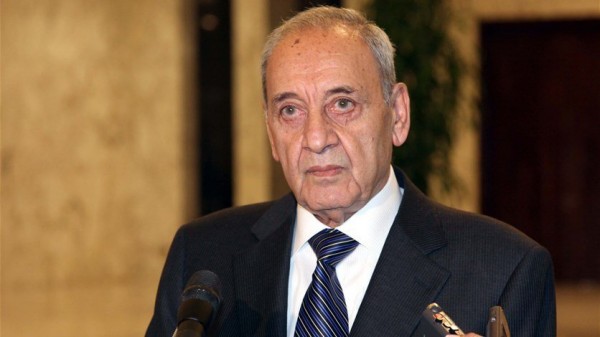 Speaker Nabih Berri proposed the establishment of a 64 member Senate as part of the ongoing efforts to resolve the electoral law crisis.
Speaker Nabih Berri proposed the establishment of a 64 member Senate as part of the ongoing efforts to resolve the electoral law crisis.
The proposed Senate will consist of 32 Muslim senators and 32 Christian senators and will be headed by a member of the Druze community, media reports said on Sunday.
“Should an agreement be reached on allocating its chairmanship to the Greek Orthodox community, the Druze community would be given either the deputy speaker post or the deputy premier post,” al-Mustaqbal newspaper quoted Berri’s visitors as saying in remarks published Sunday.
“The proposed Senate would take some powers from Parliament, especially those related to crucial issues, in line with the Taef Accord,” the visitors added.
Berri’s proposal calls for electing a Senate under a sectarian voting electoral law and a Parliament under an electoral law fully based on proportional representation.
In Lebanon the president should be a Maronite Christian, the PM should a be a Sunni Muslim and the Speaker a Shiite Muslim . The Taif accord called for the creation of a Senate that should be headed by a member of the Druze community. But according to PSP’s MP Ghazi Aridi a senate should be created after abolishing Political Sectarianism and electing the parliament on non sectarian basis:
” Creating the Senate requires a long path beginning with the establishment of the National Commission for the Abolition of Political Sectarianism, then the abolition of political sectarianism and then parliamentary elections on a national basis to the Senate.” Aridi was quoted as saying following a recent meeting at the ministry of foreign affairs to discuss the electoral law.
Berii’s ally the Iranian backed Hezbollah has repeatedly called for an electoral law for electing the parliament fully based on proportional representation but other political parties, especially the Future Movement, have rejected the proposal and argued that the party’s controversial arsenal of arms would prevent serious competition in regions where the party has clout.
In a proportional representation system Hezbollah will be able to gain more seats in the March 14 dominated areas but will not lose any seats in its dominated areas as long as it is allowed to keep its arms and use them internally for political gain, according to political analysts. In the 2009 election in the areas dominated by Hezbollah , its gunmen prevented their rivals from voting and the results of the election showed it. On the other hand in the March 14 dominated areas several Hezbollah backed candidates won the election that was based on winner takes all electoral law.
According to the same analysts Hezbollah is trying to use its ally President Michel Aoun to dominate Lebanon by insisting on adopting the proportional law in a single or several expanded electoral districts.
The country has not voted for a parliament since 2009, with the legislature instead twice extending its own mandate.
The 2009 polls were held under an amended version of the 1960 electoral law and the next elections are scheduled for May 2017.

Leave a Reply
You must be logged in to post a comment.